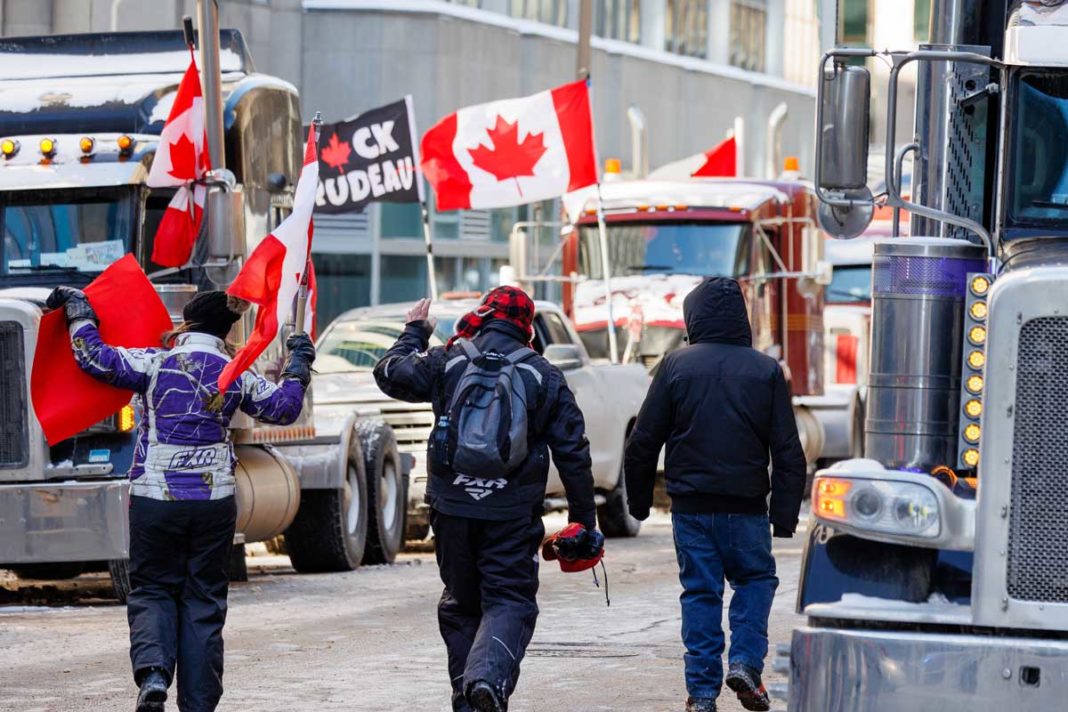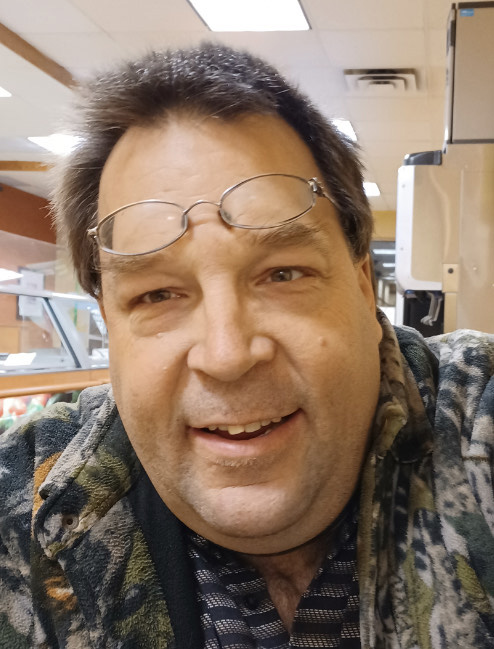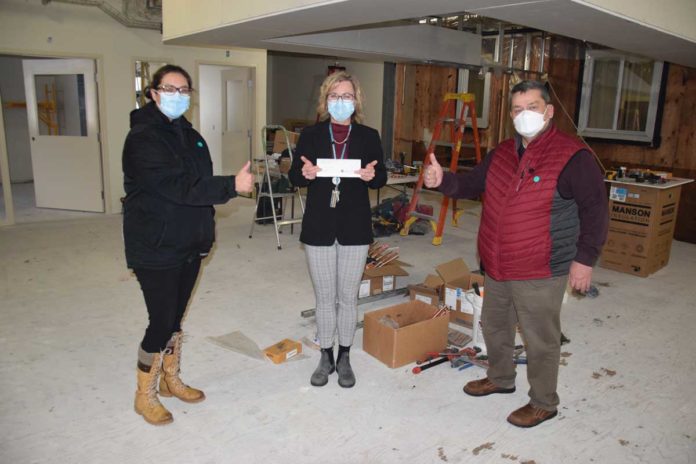CANADA—The decision of Prime Minister Justin Trudeau and the federal Liberal government to invoke the Emergencies Act for the first time ever has drawn both support and criticism from local and provincial representatives. The action, announced by Prime Minister Trudeau on February 14, grants cabinet the ability to take “special temporary measures that may not be appropriate in normal times.”
In a February 14 news conference, the prime minister said, “It is now clear there are serious challenges to law enforcement’s ability to effectively enforce the law. It is no longer a lawful protest at a disagreement over government policy. It is now an illegal occupation. It’s time for people to go home.”
He said the measures would be geographically targeted and proportionate to the threats they are meant to address. The Act gives police more tools to restore order in place where public assemblies constitute illegal and dangerous activities, such as blockades and occupations. The Act also allows the Royal Canadian Mounted Police (RCMP) to enforce municipal bylaws and provincial offences where required.
“This is about keeping Canadians safe, protecting people’s jobs and restoring confidence in our institutions,” said Prime Minister Trudeau. The government is also designating and securing critical areas such as border crossings and airports, he added. Invoking the Act will allow the government to ensure that essential services, such as towing services to remove trucks, are rendered.
The federal government is also going after financial support for illegal activity associated with the Freedom Convoy protest.
While the Act grants cabinet the ability to take special temporary measures that may not be appropriate in normal times to cope with urgent and critical situations and the resulting fallout, it is still subject to the protections of the Charter of Rights and Freedoms.
“The government invoked the Emergencies Act under a public order emergency,” said Algoma-Manitoulin-Kapuskasing MP Carol Hughes. “What we are facing right now is not a peaceful protest. It is actually an occupation which has been marred by criminal acts and has even seen convoy members deputizing themselves, claiming they have the lawful authority to detain and arrest others. As mentioned, the use of the Emergencies Act is an acknowledgement that leadership at all levels of government: (municipal, provincial and federal), has allowed things to escalate unchecked since the beginning. It is a symptom of a system that has failed to uphold even the most basic laws.”
The New Democratic Party “is going to support the Act, with reluctance,” said MP Hughes. “It’s not like the War Measures Act, as revamped stopgaps were put in place. For instance, that the Act can’t supercede the Charter of Rights and Freedoms, and stipulates the circumstances when it can be initiated,” she said, noting the government is initiating the Act under the public orders section.
“The stopgap has to continue to respect the Charter,” MP Hughes continued. “My NDP colleagues and I are taking the use of the Emergencies Act very seriously and won’t be giving a blank cheque to the prime minister. Government will have to stay within the established powers and if they don’t, we will withdraw our support. Further, a debate on revoking or amending the order can be initiated at any time when requested by either 10 senators or 20 MPs.”
The Canadian Civil Liberties Association (CCLA) said that it didn’t believe the high and clear threshold needed to invoke the Act has been met, noting the law states that it can only be used when a situation cannot be dealt with using any other law in the country.
Noa Mendelsohn Aviv, executive director and general counsel for CCLA, warned that normalizing emergency legislation “threatens our democracy and civil liberties.”
On February 17, the CCLA announced it will fight the federal government’s invocation of the Emergencies Act in court.
Duff Conacher, co-founder of Democracy Watch, told The Expositor last Thursday that the bar hasn’t been met to invoke the Act. “The government has been careful how they draft the regulations and the time is limited as to how long the Act would be in place, for 30 days, but I don’t think this protest was a threat to national security.”
“The only thing is that the government couldn’t have done this as quickly as they can through the Act,” said Mr. Conacher. “Things like shutting down banks to those making donations to the Freedom Convoy would have taken awhile, and to have tow trucks remove a (Convoy) truck, I have heard that Ottawa-area tow truck drivers and companies had previously refused.” The Act would compel them to remove parked vehicles, left to blockade downtown Ottawa.
He pointed out that Ottawa has huge tow trucks the (police) chief had said were city-owned, “so that really wasn’t a problem. Freezing people out of their bank accounts is one way to get them to leave because they wouldn’t be able to buy food without access to funds, he said.
“I really don’t think the government needed to put the Act in place, or needed to freeze the bank accounts of protestors,” Mr. Conacher said. “What was needed was for the Ottawa police to do their job and be prepared from the start. Because of this situation the chief of police, Peter Sloly, resigned. You don’t let those huge transport trucks park in front of Parliament.”
Mr. Conacher presently lives in Toronto but spent 26 years in Ottawa (excluding a separate three-year break in Toronto). “They would block off the road to keep people away from Parliament Hill, so that was the first mistake. Wellington Street is right in front of the parliament buildings and every bus that goes through Ottawa travels on that stretch of Wellington. The entire bus system was shut down. They allowed it to happen, which is ridiculous,” he said.
“Why were they (protestors) able to stay in their (turned on) trucks with heated cabs and live? They basically let them set up a home. I can tell you, if they had to walk to the Parliament building and stand on the ground and sleep there, the protestors wouldn’t have,” added Mr. Conacher.
“None of what happened would have been necessary if the police had been doing their job. They have the power to remove any vehicles. There is ‘no parking’ all around there. On top of that, the protestors had given them two weeks notice that they were coming,” he said. “In Toronto, when the protestors said they were coming, the police shut down the downtown area, so they left. They weren’t able to get close to Queen’s Park.”
He noted that RCMP could have been involved to help out Ottawa police at any time as well.”
Heather Wilson, federal Liberal riding party chair for Algoma-Manitoulin-Kapuskasing and two-time federal Liberal candidate, said she agrees with the government’s decision. “I think it was drastic and unfortunate that it had to come to this. The protestors have been asked many times to leave but haven’t. I think most of Canada and the residents of Ottawa have had enough.”
Ms. Wilson didn’t feel the government had other options. “Emergency measures are drastic but was anything else working? No. The protestors want the mandates lifted for COVID-19 but the data shows it shouldn’t be done. We are all tired of the pandemic, but as I heard someone say last night, we’re tired of winter too. Does that mean we are taking off our winter coats?”
“The governments are making the decisions based on science and data, as most responsible governments do,” added Ms. Wilson. “Just as Doug Ford and the provincial government are making decisions based on health data as well. “I think the protestors went too far burning the effigy of the prime minister with a noose around his neck, for example. A lot of Canadians don’t agree but Canadians are, for the most part, quiet and law-abiding people who don’t go overboard like some of our neighbours do. One percent of the population have been protesting. They sure have made a lot of noise.”
Manitoulin’s Brendan Addison has been in Ottawa since the start of the protest. He said he has seen progress and things have changed but that “is more reason for us to hold the line and stick with our plan. I never thought I would see this in my life in Canada. I agree things like white supremacists name-calling shouldn’t be tolerated. If they can pack a stadium in the United States with 70,000 for Super Bowl and no one has to wear masks but I can’t sit in The Codmother’s in Gore Bay and have a sandwich, there’s a problem with today’s society.”
He’s in Ottawa to support the truckers but has personal reasons for not seeing eye-to-eye with the government, stated Mr. Addison. “But our rights and freedoms are very valuable to myself and my children’s future. I don’t think we’ve done anything wrong.”
He said he hasn’t seen the acts of violence or racism that mainstream media has been portraying and what he has seen is positive: “the people of Canada trying to help each other and our rights.”
As for the Emergencies Act, Mr. Addison feels it was unjustified. “There’s no threat here. There’s no hostile threats and no one has been injured. The majority of the people are here because they have been forced by mandate to wear masks and be vaccinated. I don’t hear of hospitals being filled or people dying.”
“Even with the protest here and the gridlock and everyone so close together, no one is getting sick,” Mr. Addison said. He noted that reports have said taking the vaccines increases the likelihood of myocarditis, an inflammation of the heart muscle that can cause death. “We’re still learning the long-term effects of these vaccines.”
Michael Kempa, professor of criminology at the University of Ottawa told CBC News Now Live in an interview on television last Friday that he is in support of the Emergencies Act, in terms of how the police were slowly and methodically moving protestors from the downtown area of Ottawa last Friday.
“So far, I would have to say it has been a tremendous success mostly because of the restraint the police have shown,” said Mr. Kempa. “We all know that it has not always been that shown that way in past protests.”
“Hopefully, it is the start of a new trend; that if the hardest edge of how the state shows restraint, it gives me great confidence as we move forward in the process in the courts, and inquiries, that with the mobilization of the Emergencies Act things will go well,” said Mr. Kempa.
MP Hughes acknowledged there is nothing wrong with protests taking place but not when the protest becomes an occupation. “Things can’t continue the way they have with no one having control,” she said. “We need to respect everyone. Hate crimes are not acceptable and things have been escalating.”
A parliamentary review committee made up of all recognized parties and composed of both senators and MPs will be created in the coming days. Their mandate will be reviewing the exercise of powers and the performance of duties and functions pursuant to a declaration of emergency. The committee will have the power to revoke or amend orders and regulations made under the Act. They must report at least once every 60 days to the House of Commons.
“All in all, the provincial and federal governments have put messages in place in the best interest of the health and safety of the public,” said MP Hughes. “It (the mandate) was not meant to disrupt the economy or peoples’ lives but to keep everyone healthy and safe. We’ve done well in Canada with vaccines. We haven’t seen the number of deaths that other countries have.”
She said that in Canada, the number of deaths from the pandemic is decreasing. “In Canada, we have had 35,791 deaths from the pandemic. Three weeks ago, we had 1,000 in Canada and then 906 and 673 over the past three weeks. In Ontario, those numbers are 416, 369 and 223. This shows that things are getting better and we’ll be able to open things up more. I understand people’s frustrations.”
Over 2,000 fines have been issued so far to people involved in the Ottawa downtown occupation.





